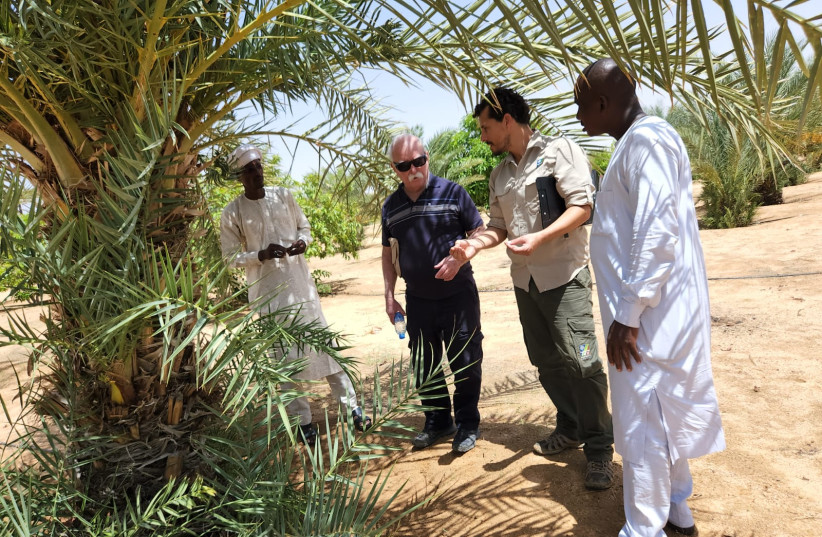On Sunday, an Israeli delegation returned from a two-week mission to Chad, where it promoted sustainability and combated desertification, Keren Kayemeth LeIsrael (KKL-JNF) announced.
The experts arrived in the country on August 7 and spent time in Amdjarass and Ndjamena. Their primary focus was to assess the nation’s date agriculture sector to enhance date cultivation and yield while identifying novel markets for date plantations.
“KKL-JNF and Southern Arava R&D work together throughout the year to develop additional and diverse fields of knowledge in forestry, climate, and agriculture,” said Amnon Greenberg, Israeli expert at Southern Arava R&D and chairman of the Date Round Table at the Israeli Plants, Production and Marketing Board. “I have no doubt that the partnerships we have created will help many around the world to produce high-quality and healthy food, alongside dealing with the climate crisis.”
The Plants Production & Marketing Board was established nearly 20 years ago to elevate essential matters and initiatives for individual farmers onto a broader canvas. The board is the representative body for the vegetables, fruits, citrus, and olives sector. Its membership encompasses cultivators, community-level wholesalers, exporters, governmental authorities, and delegates from the Israel Consumer Council.
The Israeli delegation in Chad also collaborated with their local counterparts to closely monitor water fluxes, volumes, and the potential reservoir capacity near Amdjarass. This involves a deeper comprehension of the water equilibrium and the fluctuations in levels across various seasons and over time, considering factors such as river inflow, precipitation, overflow, and soil erosion.

Ultimately, the team assessed the reservoirs’ capacity to retain water and ascertain maintenance requirements.
The importance of collaboration in combating the climate crisis
“International collaborations such as this are especially significant in dealing with the global climate change,” Asaf Karavani, director of the Forest Management and Monitoring Department for KKL-JNF, also leading the mission. “Only together can we prepare for and deal with its consequences. KKL-JNF, as a leading, professional and enterprising environmental organization, is committed to finding sustainable solutions to local and global challenges. Therefore it is our delight to visit Chad and deepen our relations, the channels of mutual knowledge exchange and cooperation.”
KKL-JNF, Israel’s largest non-governmental organization with United Nations status, has engaged in longstanding international collaboration on global environmental issues, including African projects. The organization excels in combating desertification, water resource management, and promoting sustainable agriculture practices.
In July, a team of Israeli water technology experts visited South Africa, engaging with local authorities to share their innovative solutions. Additionally, in May, Kenya unveiled plans to partner with KKL-JNF to establish a “Zion Forest” comprising at least 5,000 trees to tackle desertification within the country.
The Environment and Climate Change portal is produced in cooperation with the Goldman Sonnenfeldt School of Sustainability and Climate Change at Ben-Gurion University of the Negev. The Jerusalem Post maintains all editorial decisions related to the content.
